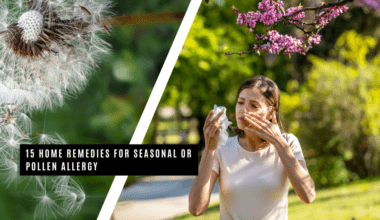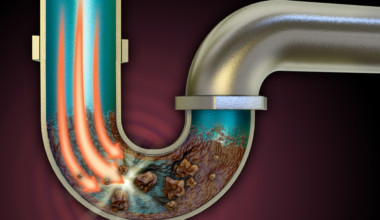You brush your teeth, use mouthwash, and eat mints, but still, your breath could drop a horse. It’s not your fault; even as you are reading this, bacteria that cause bad breath are multiplying in your mouth, ready to strike again. Read on eight ways to stop bad breath and get rid of bad mouth bacteria.
Table of Contents
What Causes the Bad Breath
Bad breath, or halitosis, is caused by any number of things. The most notable reason is bacterial growth in your mouth. This is caused by dehydration, tonsillitis, poor oral hygiene, stomach ulcers, overusing mints, and…wait. Overusing mints? Yep.
- If you pop mints on a regular basis, you are actually feeding the nasty bacteria that thrive on sugar. On a side note, perhaps the bacteria have minty breath, too.
- Bad breath is also caused by illness and could be an indicator of something more serious. Gum disease and bad breath could be a sign that you are at risk for developing heart disease.
- As mentioned above, bad breath can be linked to ulcers as well, and bad breath can diagnose some illnesses such as liver and kidney disease, diabetes, renal failure, and even asthma.
- Your diet plays a large part in bad breath as well. Low carb diets are notorious for bad breath caused by ketosis, which is when your body enters its fat burning state. Spicy or ethnic foods that contain curry and garlic will stay on your breath long after your meal is over, as well.
- Not drinking enough water can lead to dry mouth, meaning that you are not producing enough saliva, and saliva is nature’s own way of controlling bad breath and bacterial growth.
- Smoking and alcohol consumption will lead to bad breath as well.
How to Stop Bad Breath from the Mouth
There are several ways to battle the bacteria in your mouth that can cause bad breath from dietary adjustments to proper oral hygiene. Read on for eight proven ways to stop bad breath caused by bacterial growth.
1. Proper Oral Hygiene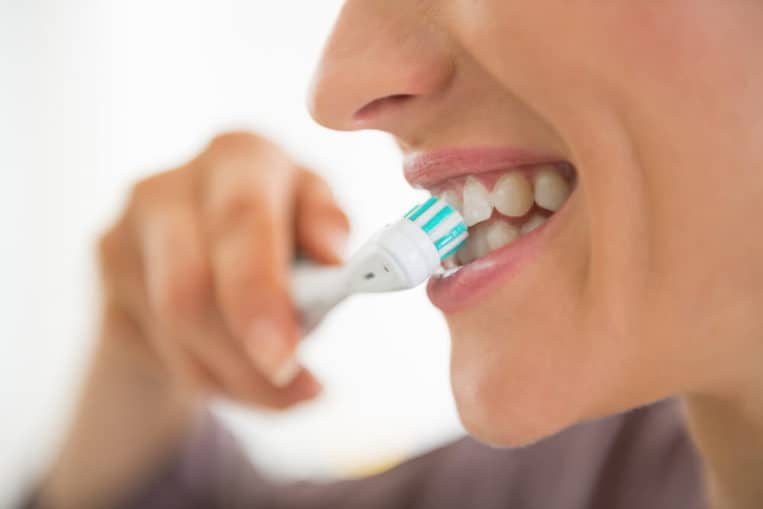
This seems like a no-brainer, but it is the first step to battling bad breath. Brushing your teeth at least twice a day and flossing regularly remove food particles that trap and feed the bacteria in your mouth.
In addition to brushing your teeth, brush all surfaces of your mouth including the roof of your mouth and your tongue. There are special tongue scrapers that are designed to remove bacterial buildup from your tongue as an extra insurance policy.
Which is better: electric toothbrushes or manual ones? The truth is that both are effective when used correctly, and the opinions from dentists are all over the map on this one.
What they all agree on, though, is that brushing your teeth for at least two minutes twice a day is the most effective way to achieve good oral hygiene.
2. Chew Some Herbs
Some herbs like aniseeds and cloves have special antiseptic properties that can kill the bacteria in your mouth. Chlorophyll is another natural bacterial fighting weapon and can be found by chewing sprigs of leafy herbs like mint, basil, and parsley.
Citric acid is another weapon in the natural arsenal; chew an orange or lemon rind to release saliva-stimulating citric acid.
Related: 15 Home Remedies for Bad Breath
3. Eat Yogurt 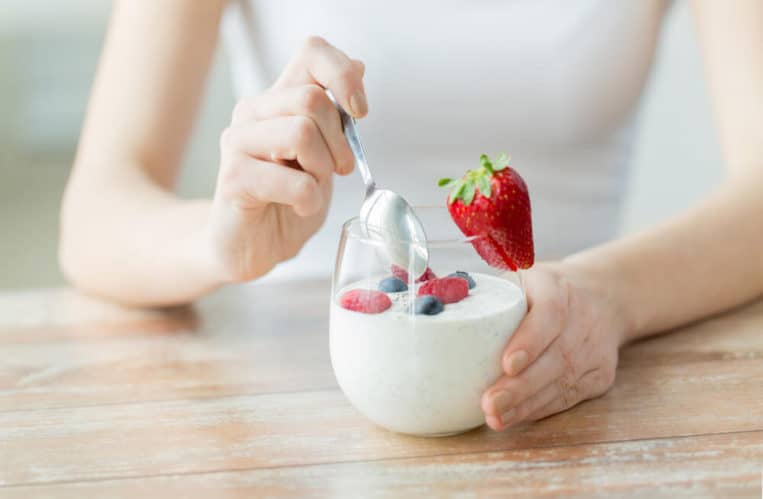
Your diet plays a large part in bad breath as well. Low carb diets are notorious for bad breath caused by ketosis, which is when your body enters its fat-burning state.
A study has shown that eating yogurt every day for two months decreased terrible oral bacteria by nearly 80%. Yogurt contains good bacteria that not only replaces odor-causing bacteria in your mouth but is all-around good for you.
4. Stay Hydrated
Dehydration causes dry mouth, which is a reduction of saliva in your mouth. Staying hydrated helps to maintain saliva. Besides, drinking water regularly will help rinse away food particles that trap bacteria. Dehydration is the second biggest cause of bad breath, right behind poor oral hygiene.
5. Chew Sugar-Free Gum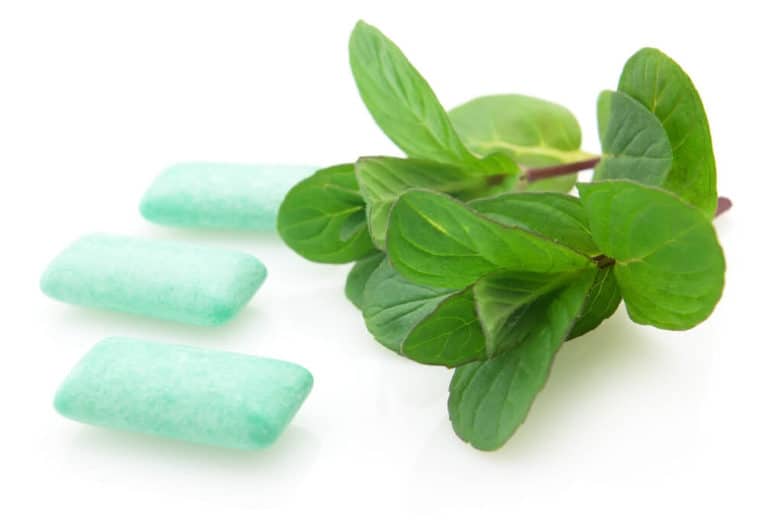
Spicy or ethnic foods that contain curry and garlic will stay on your breath long after your meal is over, as well. So, you can have chewing gum after eating. Chewing gum stimulates your mouth to produce more saliva.
Make sure to use sugar-free gum, and try to find gum containing the Xylitol. Xylitol is a natural sweetener that fights odor-causing bacteria in your mouth.
6. Don’t Use a Chemical Mouthwash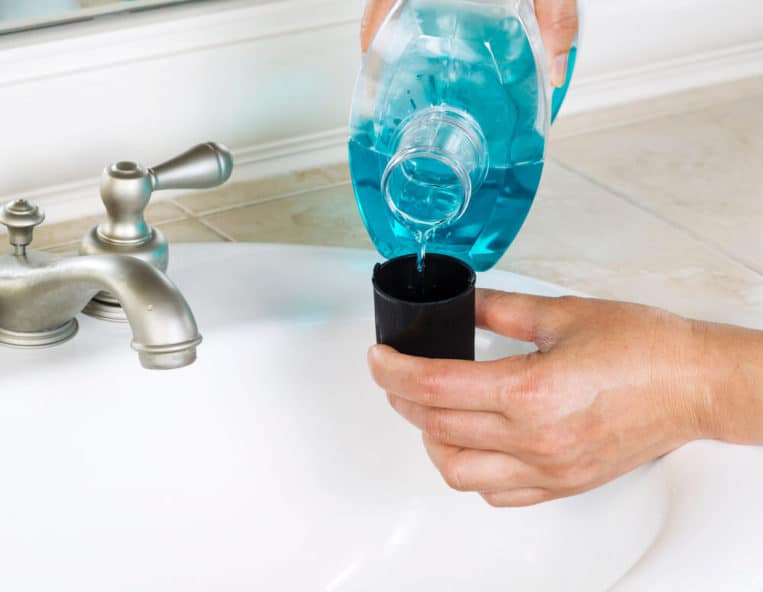
The mouthwash debate has been ongoing for some time. While it may fight bad breath in the short term, in the long run, it may be causing even more problems. Because mouthwash has a high alcohol content, most chemical mouthwashes dry out your saliva stores, causing more bacterial growth.
Saliva is what helps the mouth to have healthy pH levels, which naturally combat bad breath-causing bacteria. Also, chemical mouthwashes not only kill the bad, but they also kill the good bacteria that fight odor-causing bacteria as well.
Many types of mouthwash claim to destroy odor causing plaque, and that may not be true. The truth is that plaque can only be removed from brushing and flossing. Mouthwash cannot penetrate to kill bacteria that are growing under the plaque on your teeth.
7. Rinse with Warm Salt Water
Saltwater is a natural home remedy to cure bad breath. It turns your mouth slightly acidic, which prohibits the build-up of harmful bacteria. Also, you can rinse your mouth with anti-microbial essential oils such as lemongrass, peppermint, eucalyptus, and clove oil. Dilute these oils with water and gargle without swallowing.
8. Eat More Fibrous and Raw Foods
Munching on a carrot stick does more than help your waistline, it will also help you fight odor-causing bacteria. Raw foods contain less bacteria feeding sugars and can help remove plaque from your teeth.
Bonus: When all else fails?
If you’ve been battling chronic halitosis that never seems to go away despite your best effort, it may be time to see a dentist to rule out any underlying gum or other oral diseases. What did you think of these eight ways to kill bacteria and stop bad breath? Comment below if we’ve missed any!


